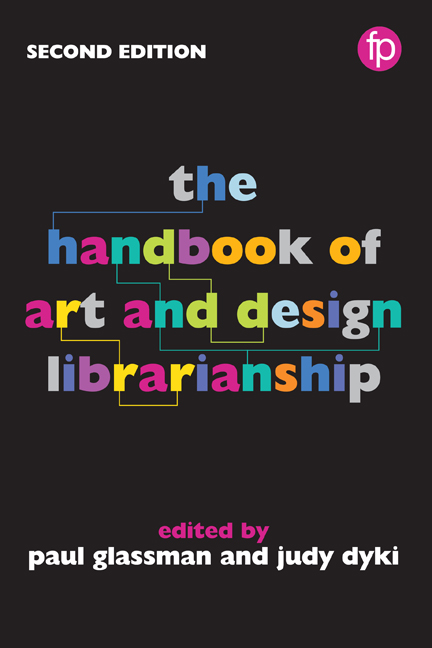Book contents
- Frontmatter
- Contents
- List of figures and tables
- Notes on contributors
- Foreword
- Preface
- Part I Roles and responsibilities
- Part II Materials and collection management
- Part III Teaching and learning
- Part IV Knowledge creation
- 21 The ever-shifting landscape: mapping the present and future of digital art histories
- 22 Critical cARTography: mapping spaces for dialogue about identity and artistic practices
- 23 More than just art on the walls: enhancing fine arts pedagogy in the academic library space
- 24 Beyond the monograph? Transformations in scholarly communication and their impact on art librarianship
- Part V The physical environment
- Part VI Promotion and sustainability
- Appendix Library profiles
- Index
24 - Beyond the monograph? Transformations in scholarly communication and their impact on art librarianship
from Part IV - Knowledge creation
Published online by Cambridge University Press: 08 June 2018
- Frontmatter
- Contents
- List of figures and tables
- Notes on contributors
- Foreword
- Preface
- Part I Roles and responsibilities
- Part II Materials and collection management
- Part III Teaching and learning
- Part IV Knowledge creation
- 21 The ever-shifting landscape: mapping the present and future of digital art histories
- 22 Critical cARTography: mapping spaces for dialogue about identity and artistic practices
- 23 More than just art on the walls: enhancing fine arts pedagogy in the academic library space
- 24 Beyond the monograph? Transformations in scholarly communication and their impact on art librarianship
- Part V The physical environment
- Part VI Promotion and sustainability
- Appendix Library profiles
- Index
Summary
Introduction
The Association of College & Research Libraries (ACRL) defines scholarly com - munication as ‘the system through which research and other scholarly writings are created, evaluated for quality, disseminated to the scholarly community, and preserved for future use’ (ACRL, 2006); it is the bedrock of the academic enterprise. Encompassing both formal and informal channels for the exchange of information, it extends across disparate disciplines and bridges distinct areas of expertise. It is the means by which existing scholarly knowledge is consumed, interpreted and reciprocally transformed through new scholarship.
The academic library's role in this process is substantive. By providing access to published scholarship, whether in print or electronic form, library collections increase the potential points of contact between authors and their audiences. In doing so, the library acts as a seedbed for the research of other scholars, thereby furthering the creation of new scholarship and perpetuating the scholarly communication life cycle. It thus occupies a critical point along the scholarly communication chain.
Over the past 30 years, however, scholarly communication has become unmoored from the institution it serves. This phenomenon was initially masked by the rapid expansion of academic specialization and an overall growth in library budgets in the decades after World War 2 (Henderson, 2002). Today the effects of that detachment are more readily apparent. Trends in scholarly publishing, particularly the adoption of forprofit business models, have made the library's ability to provide access to the ever-expanding volume of scholarly material increasingly problematic. Scholarship has taken on the unique identity of a commodity, one in which universities frequently invest twice: once when funding the research of faculty and students, and again when their libraries purchase that research on publication. At the same time, the proliferation of digital technology and informal internet-based networks for communication has led to powerful new models, cheaply maintained and freely accessible, for conducting and disseminating research beyond conventional academic channels, many of which bear little resemblance to the book or article format. Indeed, it is in part the wide-ranging properties of the digital environment – its capacity for inexpensive, fast and decentralized reproduction of information – that has thrown many of the less attractive aspects of traditional scholarly publishing into relief.
- Type
- Chapter
- Information
- The Handbook of Art and Design Librarianship , pp. 241 - 260Publisher: FacetPrint publication year: 2017



